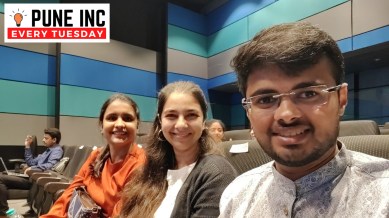Click here to join Express Pune WhatsApp channel and get a curated list of our stories
Pune Inc: Winner of Startup India seed fund, this city enterprise seeks to enable early detection of lung cancer
BiomarkIQ, incubated at IISER Pune, is creating a non-invasive tool by which vulnerable people can get tested.

Behind a password-controlled door of the Atal Incubation Centre at IISER Pune, a team of three works in a white-walled office with laptops as their only tool. They are creating a tech platform, called VarSee, which aims to save lives by enabling early detection of lung cancer.
BiomarkIQ’s solution, one of its kind in Asia, is getting attention from the government of India and other organisations. Last week, the company received a seed fund of Rs 17 lakh from Startup India. Three months ago, Manasi Kulkarni-Khasnis, who founded the company with Snahlata Singh and Atharva Joshi, was a runner-up at TiE Global Women Pitch, a competition for women entrepreneurs.
monthly limit of free stories.
with an Express account.
The company is also incubated at the Science and Technology Park of the University of Pune, where they received the Department of Science & Technology’s Nidhi Prayas grant in August. The money and the mentorship are being used to develop VarSee, which aims to hit the market in two or three years.
Early detection is key
According to the World Health Organization (WHO), there were 9.6 million cancer deaths globally in 2018, of which the most were due to lung cancer.
Lung cancer is difficult to detect as there are few symptoms at the early stages. Diseases of the lung are also on the rise in the aftermath of Covid-19 and the rising pollution.
“Early detection emerges as a key factor in improving survival rates in lung cancer,” says Kulkarni-Khasnis, who lost her father, an MD, to Interstitial Lung Disease. “His prognosis was extremely poor. Until the end, doctors could not rule out cancer with confidence,” she adds.
VarSee is a non-invasive and sensitive diagnostic tool that uses biotechnology to identify unique biomarkers of lung cancer. Healthcare in the country is in need of non-invasive, non-intrusive ways by which medical professionals can quickly understand if an individual is showing any signs of cancer.
‘It’s going to take time to build awareness’
Health tech, which is expected to reach $25 billion by 2025, is a crowded field in India.
One of BiomarkIQ’s big challenges will be the nature of the market— most of the healthcare sector is focused on treating existing complications rather than preventing future ones.
VarSee requires individuals to get a blood test in a laboratory, where a biomarker panel in the solution and AI-driven technology will create a hyperpersonal diagnosis.
But, will people get tested if they do not feel ill?
Kulkarni-Khasnis says that BiomarkIQ has worked on building awareness from the very beginning. Campaigns are planned for smokers and those in vulnerable industries, such as cotton, coal, mining, and cement.
“Because of Covid, I think the paradigm is shifting but it’s going to take time to build awareness,” says Kulkarni-Khasnis. She estimates that the market size globally is $200 billion and, in India, it is around $ 20 million. “The market in Maharashtra will be worth $1 million in the next two years,” she adds.
Though the VarSee market fit, the company is facing the challenge that many innovators in health tech do—a paucity of funding. BiomarkIQ will need Rs 5 crore to see this through and has received Rs 25 lakh till now.
“But, there are a lot of studies that have been done on lungs. We are committed to developing the solution. If it fits the lungs, we can replace this with any other cancer. We are starting with lungs,” says Kulkarni-Khasnis.
Click here to join Express Pune WhatsApp channel and get a curated list of our stories